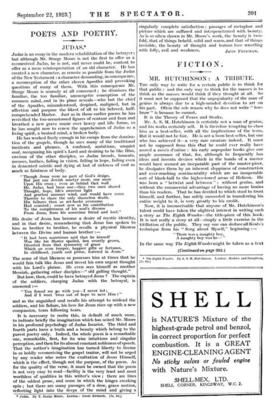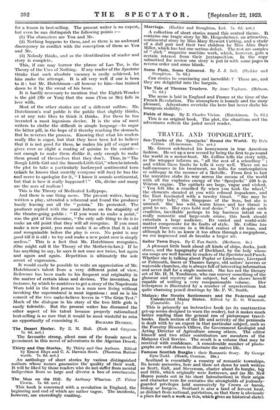FICTION;
MR. HUTCHINSON : A TRIBUTE.
Tim only way to write for a certain public is to think for that public : and the only way to think for the masses is to think as the masses would think if they thought at all. So it must not be supposed that the unpopularity of the man of genius is always due to a high-minded devotion to art on his part. Often the sole reason why he does not write " low- brow " is because he cannot.
It is the Theory of Foxes and Storks.
Mr. A. S. M. Hutchinson is certainly not a man of genius, and his works certainly sell. It is therefore tempting to class him as a best-seller, with all the implications of the term. But it would not be fair. He is not a born best-seller, but one who has achieved it—a very rare creature indeed. It must not be supposed from this that he could ever really have scored a surds d'estime : his early unpopular books give one ample assurance of that, for, although he frequently has ideas and invents devices which in the hands of a master would have seemed an inseparable part of the master-piece, he dissipates them by an inherent sloppiness of construction and over-reaching sentimentality which are an insuperable sort of black-ball to the higher-toned areas of Helicon. He was born a " betwixt and between " : without genius, and without the commercial advantage of having no more brains than his readers. That he has decided to which stool to trust himself, and further, has safely succeeded in transferring his entire weight to it, is very greatly to his credit. - Now, it is inconceivable that anyone of Mr. Hutchinson's talent could have taken the slightest interest in writing such a story as The Eighth Wonder—the title-piece of this book. It is not really a story at all—simply a little exercise in the titillation of the public. They say one can deduce all Keats's technique from his " Song about Myself," beginning :-
" There was a naughty boy,
A naughty boy was hc—
In the same way The Eighth Wonder might be taken as a text (Continued on page 892.)
• The Eighth Wonder. Ly A. EL N. Hutchinson. London : Hodder and Stoughton. (it,. ad.]
for a lesson in best-selling. The present writer is no expert, but even he can distinguish the following points
:-
(1) The characters are You and Me. (2) Nothing happens to them, and so there is no awkward discrepancy to conflict with the conception of them as You and Me. (3) Nobody thinks, and so the identification of reader and story is complete,
This, if one may borrow the phrase of Lao Tse, is the Theory of the Uses of Nothing. If any reader of the Spectator thinks that such absolute vacancy is easily achieved, let him make the attempt. It is all very well if one is born to it : but Mr. Hutchinson—all honour to him—has trained down to it by the sweat of his brow.
It is hardly necessary to mention that the Eighth Wonder is the girl (Mc or You) that the man (You or Mc) falls in love with.
Most of the other stories are of a different calibre. Mr. Hutchinson's real public is the public that slightly thinks, or at any rate likes to think it thinks. For them he has invented a most ingenious device. It is the aim of most writers to clothe the difficult in simple language—to sugar the bitter pill, in the hope of it thereby reaching the stomach. But he reverses the process. Knowing that what his readers really like is sugar, but that they have been led to believe that it is not good for them, he makes his pill of sugar and gives ever so slight a coating of quinine to the outside— not enough to make them dislike it, only enough to make them proud of themselves that they don't. Thus, in " The Rough Little Girl and the Smooth Little Girl," when he intends the plot to take a particularly hackneyed sentimental turn (which he knows that secretly everyone will love) he has the cool nerve to apologize for it, " I know it sounds sentimental, but that is how it really happened ! " Oh, divine and many arc the uses of realism This is the Theory of Medicated Lollypops.
And there is one thing more. The present writer, having written a play, attended a rehearsal and found the producer busily leaving out all the " points." He protested. The producer replied with the usual lecture on the stupidity of the theatre-going public : " If you want to make a point," was the gist of his discourse, " the only safe thing to do is to make an old point that they will all recognize. If you must make a new point, you must make it so often that it is old and recognizable before the play is over. No point is any good till it is old : to try and make a new point once is simply useless." This is a fact that Mr. Hutchinson recognizes. (One might call it the Theory of the Mother-in-law.) If he has anything to say, he says it not once nor twice, but again and again and again. Repetition is ultimately the sole secret of expression.
It would easily be possible to write an appreciation of Mr. Hutchinson's talent from a very different point of view. Reference has been made to his frequent real originality in the matter of certain ideas and devices. The invention, for instance, by which he contrives to get a story of the Napoleonic Wars told in the first person to a man now living without invoking the supernatural is most ingenious : and so is his conceit of the two make-believe lovers in " The Grim Test." Much of the dialogue in his story of the two little girls is easily tolerable. But the present writer has discussed the other aspect of his talent because properly rationalized best-selling is so rare that it would be most wasteful to miss







































 Previous page
Previous page